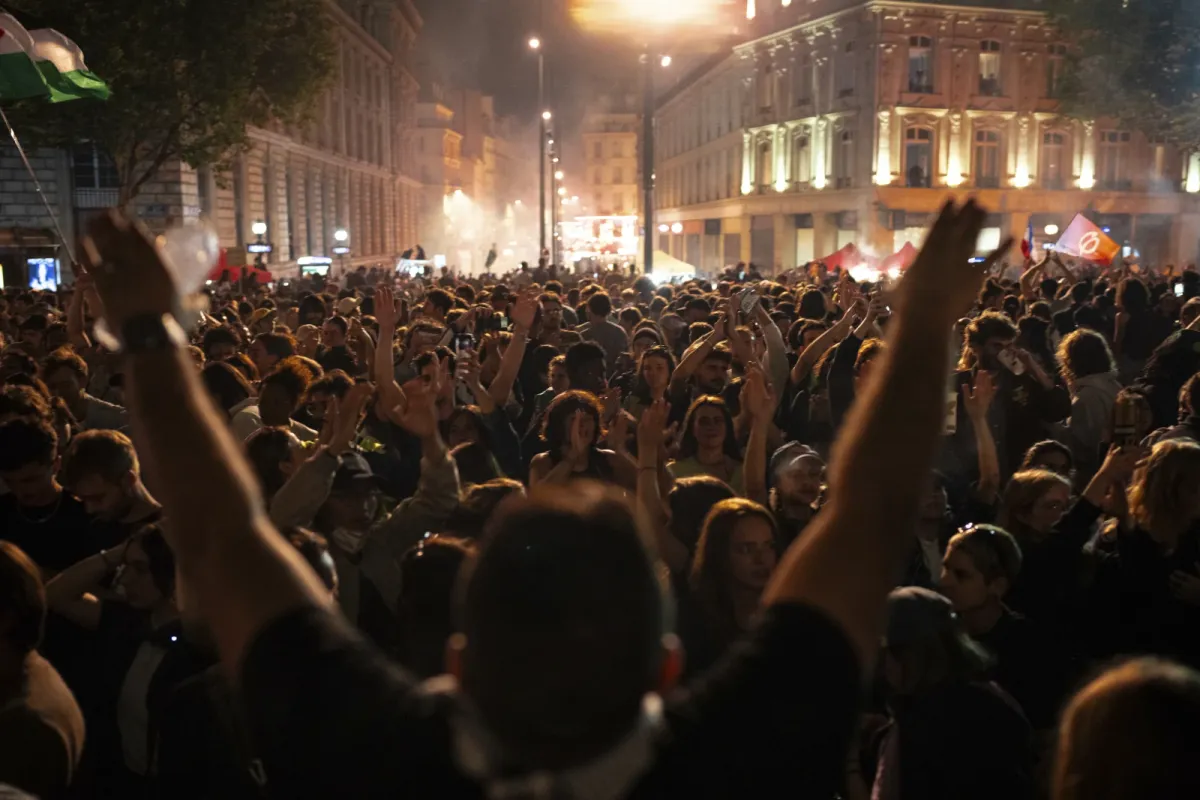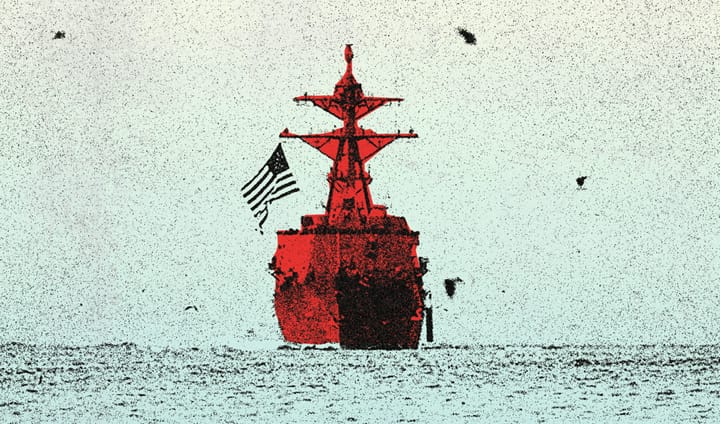The world is still trying to understand what happened last night in France. Panos Theodoropoulos writes a preliminary reflection on what yesterday's election results mean for antifascist resistance and the wider struggle against neoliberalism.
By Panos Theodoropoulos
Is it deluded to be optimistic in the midst of a genocide? Perhaps so. And, perhaps, what just went down in France will be another moment of false hope for leftists, anarchists, and anyone who dares to imagine beyond the dystopia of proliferating neoliberalism and the onslaught of fascism. However – and this might only be a product of the fleeting elation of the current historical moment – we must reflect on the significant victory in the long struggle against fascism that the French people delivered yesterday. Like snatching life from the jaws of death, the fascist National Rally was denied power, despite overwhelming indications that, this time around, the birthplace of the Paris Commune would be governed by Le Pen and Bardella.
No illusions should be harboured about the potential of parliamentary politics to deliver substantial changes to our lives; indeed, it is highly likely that Mélenchon's left coalition won't push through any substantial emancipatory measures in a hung parliament whose ultimate characteristics it is still way too early to predict, analyse, or understand. It is also probable that the left coalition will betray everything it stood for and enter into an agreement with the right in order to gain a Pyrrhic majority that will prevent them from actually pushing through the moderate proposals that they have outlined. And, of course, even if the left had managed to gain an absolute majority on its own, the capacities of any governmental force to improve working lives are curtailed by the capitalist system itself.
History is clear: the political power to gain control of our lives can only come from the actions that people take in the arena of everyday life – in their workplaces, homes, and communities – and I would never argue the contrary. If anything, it is the mobilisations in France that consistently prove that it is through direct action that another world is possible.
There is, however, another point that we must focus upon: the French people's resistance to fascism – this time expressed through the ballot box – against what every analyst predicted would have been a resounding victory for the National Rally. In an historical period where the European left has seen nothing but defeats for a decade, the French demonstrated that a very significant portion of the population refuses to roll over and allow the fascists to dictate how they will live. This is important. It has nothing to do with whether one believes in parliamentary politics; it is an indication of where people stand politically, and of how they imagine their future.
This is not necessarily a victory for the left – comrades in France would be better placed than us to speak on this, and Interregnum will republish relevant articles once they are written – but it is a victory against a concoction of racism, nationalism, and a nostalgia for ethnic 'purity' as the supposed solution to the demons unleashed by neoliberalism and globalisation. It is an indication that, contrary to what the dominant media would like us to believe, the far-right has not yet achieved its goal of translating its ideas into a 'common sense' that the masses uncritically accept and reproduce. It is therefore also an indication that, despite the darkness that is suggested by our daily lives, conditions are ripe for organising in more substantial, spontaneous and empowering ways.
Organised radical political movements are still underdeveloped – particularly when compared to what we witnessed around Europe in the early 2010s. And yet, while the recent European elections demonstrated that the far-right is anything but retreating, and while we endure the daily corrosive effects of neoliberalism, precarity, and alienation, the fact that the French people collectively blocked what was almost certain to be a fascist victory in the second largest economy of the Eurozone is reason to hope.
This victory is paralleled by the momentous waves of solidarity to the Palestinian people that are extending all over the world, in what is undoubtedly the greatest international mobilisation since the Occupy/squares movements in the 2010s and the resistance to the Afghanistan and Iraq wars in the early 2000s. At the same time, in Kenya the youth are fighting in the streets in thousands against their government; and in Argentina, resisting the most bloodthirsty and brazen manifestation of neoliberalism in years in the face of Javier Milei, workers are foregrounding autonomy, solidarity, and mutual aid.
These movements are disconnected and involve a myriad of contradictory forces. From the outside, there seems to be no discernible overarching dream, or goal, of what a future society would look like. They seem to be, in short, mostly reactive rather than creative. It is therefore not possible to yet speak of a resurgence of the leftist imaginary, one that proposes a completely different way of organising our collective lives in the way that we experienced in the early 2010s.
Following the financial crash of 2008, social movements – left, communist, anarchist, and autonomist forces included – managed to harness people's realisation that the current socioeconomic system simply does not cater to their interests, and they did so in a way that established alternatives. The 2010s birthed a tidal wave of activity across the world in which people were actively debating and enacting various ways of organising themselves democratically. At the same time, the feminist and ecological revolution in Rojava functioned as an inspiring manifestation of these ideas put into action; physical institutions like squats and occupations sprung up across Europe, and the networks of solidarity that emerged were crucial in developing responses to a range of social crises, from resisting evictions to housing refugees. While these developments were reactive in the sense that they were plastering wounds, they also carried with them the cells of an alternative way of organising our collective existence.
Today's movements are still very far away from establishing a similar state of affairs. Resistance has not yet been translated to the creation of structures that allow people to increase their democratic control over their lives; this, ultimately, is the only sustainable way to avert fascism. Yet, recent developments might – and this is where it is important to exercise caution, lest hindsight prove painful – be indicative of a wider turning of the tide.
This turn does not reduce the responsibility of the movements on the ground; if anything, it amplifies it. The reasons to be optimistic are located in people's active resistance to fascism. This resistance is a daily, and dangerous, choice, of which yesterday's electoral result in France is only a measurable – if incomplete – illustration. At the same time, it must be remembered that the fascists did gain their largest ever number of votes, and will be busily organising to assume power in 2027. Yesterday's victory against them is not the end of the fight; but it is a welcome breath of respite to fuel the long heaves that will be required tomorrow.
Parliamentary politics will invariably fail to deliver any empowering results, and, similarly to the experiences of Greece under SYRIZA, their failure will only push more people towards the far-right. Moreover, as history has repeatedly shown, there will be a backlash from the top: the bosses and their fascist puppets will immediately move to stifle any substantial progressive developments, and organising on the ground is crucial to defend any gains. It is the responsibility of radical and anti-authoritarian social movements to harness the energy that is currently expressing itself internationally and steer it towards the establishment of institutions that will allow workers to seize power over their daily lives into their own hands. There is no avoiding the necessity of organising on the ground.
Yet, in the face of darkness, the French people's tangible victory against the onslaught of fascism must be respected. We still have a very long way to go; but, perhaps, our future is not as bleak as what it looked like yesterday. And, for everyone that is struggling to make this future brighter, this can only be a reason to smile.
Panos Theodoropoulos is a political sociologist and a member of the Interregnum collective. He is currently finalising a book on migrant labour and resistance in the UK, to be published in 2025 through Polity Press.






Comments ()